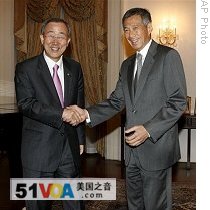Bangkok
02 July 2009
United Nations Secretary-General Ban Ki-moon visits Burma Friday to push for the release of political prisoners and national reconciliation. His visit comes as Burma's military rulers seek to jail democracy leader Aung San Suu Kyi. Rights groups and Burma's government in exile hope the U.N. chief's intervention will make a difference.
 |
| UN Secretary-General Ban Ki-moon, left, with Singapore's PM Lee Hsien Loong at the Presidential Palace, in Singapore, 02 Jul 2009 |
The widely criticized trial of the Nobel Prize winner is set to resume Friday as Mr. Ban arrives for talks with Burma's military rulers.
He acknowledged the sensitivity in the timing of his trip.
"While being conscious of this concern of international community, I'll try to use this visit as an opportunity to raise strongest possible terms and convey the concerns of the international community of the United Nations to the highest authorities of Myanmar government," said Ban.
Aung San Suu Kyi was arrested for allowing an unauthorized visitor to stay at her home. If convicted, she could face five years in prison.
It was not clear if Mr. Ban will meet with Aung San Suu Kyi.
U.N. envoys have long pushed the Burmese government to release all political prisoners and allow democratic reforms.
But in the past two years, the number of dissidents locked up has nearly doubled to more than 2,000.
Benjamin Zawacki, a Burma researcher for Amnesty International in Bangkok, says the arrests are part of the military's plan to stamp out opposition ahead of next year's controversial elections.
"This is clearly what's driving them to keep Daw Aung San Suu Kyi behind bars or at least out of the way," said Zawacki. "They've effectively locked up the opposition and thrown away the key. And, I say thrown away the key because they've sentenced them to extraordinarily long prison terms and sent them to the furthest borders of the country."
Aung San Suu Kyi's National League for Democracy won Burma's last elections in 1990 but the military never allowed them to take power.
The government has since kept her under house arrest for more than 13 years.
The military has also cracked down on ethnic rebels, sending thousands of civilians fleeing into refugee camps in Thailand.
Zin Linn, a spokesman for the Burmese government in exile in Thailand, says Mr. Ban should push Burma's leaders, known as the State Peace and Development Council, to negotiate with the NLD leader. He says Aung San Suu Kyi is the only one who can bring together Burma's various ethnic groups.
"The most important thing is he should suggest SPDC's chief to sit down with Daw Aung San Suu Kyi and have a consultation for the betterment of the country," said Zin Linn. "Without this, the consequences may not be a good one."
Burma's government has planned elections for 2010 as part of what it calls a road map to democracy. But the army also forced through a constitution that guarantees its grip on power regardless of election results.
A senior British official in Rangoon, who did not wish to be named because of political sensitivities, told VOA the issue is not what Mr. Ban can achieve on this visit, but rather to what extent the military is willing to embrace change.
"I think the regime at the top are genuinely in some state of indecision on this," said Ban. "Because, if they really just wanted to go ahead with the road map without any changes they could have done so a long time ago, and declared the election law and set out the precise terms under which these would be held. And, the fact that these are not out in the open means that there's still room for them to reconsider what they need to do to make it far more inclusive and credible in the eyes of the world."
The U.N. Secretary-General's previous visit to Burma followed a devastating cyclone last year, when he helped convince the government to open up to foreign aid.
Burma was heavily criticized for not allowing foreign aid for several weeks while millions suffered in the wake of the deadly storm.
This time, democracy supporters hope Mr. Ban will help convince Burma's leaders to open up their prisons.